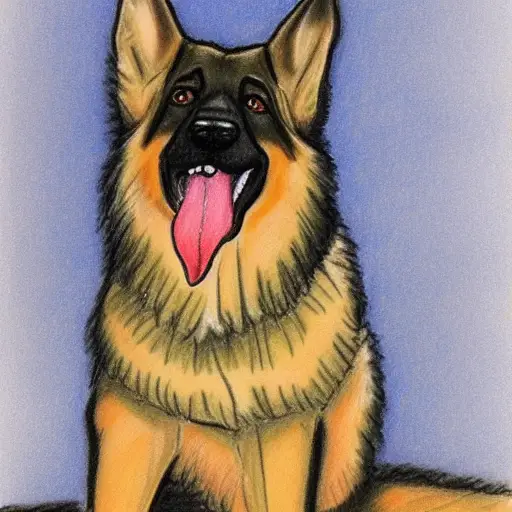If you’re worried about your older German Shepherd’s health, you’re not alone. There are several common health problems associated with older German Shepherds, and finding ways to treat them can save your dog’s life. There are natural remedies, diet changes, and exercise programs, as well as genetics.
Exercise
Exercise is very important for older German Shepherds, especially if you want your dog to stay healthy. They lose a lot of energy as they age and don’t play as hard as they used to. A daily walk or jog is important because it keeps their joints moving and helps manage their weight. Unfortunately, many German Shepherds suffer from joint problems like hip dysplasia and arthritis, which can be very painful. However, many of these issues are treatable with proper care and exercise.
Running is a great exercise for your German Shepherd because they are built for running over varied terrain. However, running on hard surfaces can cause joint pain, so it’s important to use different surfaces when exercising. Soft grass or dirt trails are ideal. It is also important to vary the pace of your dog’s running, because running at the same speed is hard on the joints.
Diet
If your German Shepherd is exhibiting signs of aging, it might be time to adjust your dog’s diet. Because large breeds tend to age more quickly than smaller breeds, they may show signs of joint and energy depletion earlier. It is important to watch for these early signs of aging so you can make adjustments to your dog’s diet and exercise. German Shepherds live an average of 10 to 15 years, so it is best to begin paying attention to their health around five or six years of age.
Diet for older German shepherds should include foods that can prevent some of these common problems. German shepherds can suffer from exocrine pancreatic insufficiency, which makes it difficult for them to absorb nutrients. This can result in symptoms of malnutrition even in dogs that eat properly. This type of condition is typically treated with medication. A pancreatic enzyme powder can help these dogs absorb nutrients and improve their overall health.
Genetics
Older German Shepherds are prone to several health problems and many of these can be genetic. Some of these issues can be treated with medication or through physical therapy. Genetic testing can identify your dog’s risk for these problems. Other problems can be prevented by proper breeding practices and regular wellness checkups.
While some health problems are purely genetic, others can be caused by diet or environment. A recent study showed that German Shepherd puppies that were overweight had a much higher chance of developing hip dysplasia. Keeping your dog in good health during puppyhood may be the best way to prevent hip dysplasia and other problems associated with older dogs.
One of the most common inherited problems in German Shepherds is Von Willebrand’s disease. This inherited bleeding disorder is characterized by a deficiency of a specific protein. This protein is necessary for clotting blood when a blood vessel becomes injured. This condition affects 30 different breeds, including the German Shepherd. Many dogs with this disease don’t show any symptoms.
Overfeeding
Overfeeding older German shepherds can lead to health problems, including bloating and diabetes. If you notice any of these symptoms in your dog, consider consulting with a veterinarian. While many cases of bloating are not serious, some can be fatal. Your vet can help you find the right diet and supplement to help your dog feel better.
German Shepherds can develop elbow dysplasia, which is a common health problem. The condition affects the elbow joints and is caused by genetics. Obesity increases the risk of developing elbow dysplasia, a degeneration of the elbow joint. As your dog ages, it can become painful and limit its range of motion.
Keeping your dog’s diet simple and high-quality is important. German Shepherds require a high-fiber diet that provides a balance of nutrients. Lean meats, fish, and organ meats are excellent sources of protein. Avoid feeding your dog chicken, which often contains byproducts.
Dysplasia
Hip dysplasia is one of the most common German shepherd health problems. While it is not contagious, the disease is painful for your pet and can lead to a reduced life expectancy. Your veterinarian may recommend changes in diet or exercise to help ease your dog’s discomfort. However, surgery may be necessary for severe cases. Proper care and treatment will allow your dog to lead a healthy, happy life.
Early detection is the first step to preventing this degenerative condition. You should watch for the warning signs of dysplasia in your German shepherd. The most effective prevention for this problem is exercise. During exercise, your German shepherd will be more likely to develop strong muscles that will help support his or her joints. In addition, you should try to avoid putting too much pressure on the affected joint. A special diet with joint health supplements can also help your dog feel better and avoid pain.
If you notice that your puppy or old German shepherd is developing hip dysplasia, it’s time to have him screened. A veterinarian will likely perform an x-ray on your dog’s hips. This procedure will help to identify the problem and determine if it can be treated or prevented.
Diabetes
Diabetes can be a serious problem for German shepherds. Symptoms can include fatigue, swollen feet, and dry mouth. If your dog has diabetes, your veterinarian will likely give it insulin injections to manage the condition. Your veterinarian can provide you with more information about how to prevent diabetes and how to treat it.
Treatment for diabetes in senior German shepherds usually involves insulin therapy along with dietary changes. This treatment is generally well tolerated by dogs, and it often involves injections under the skin. Your veterinarian may need to adjust your dog’s medication regimen from time to time. A diet and exercise plan are also crucial for successful management of the condition. In addition to medication and diet changes, your veterinarian will need to check your pet’s blood sugar levels, weigh, and appetite on a regular basis.
The pancreas is a small organ that helps regulate the body’s blood sugar levels. Insulin is a hormone produced by the pancreas and moves glucose into cells. When your dog develops pancreatitis, it affects the organ and may cause vision problems.
Skin cysts
A skin cyst in an older German shepherd is a common and treatable condition. These cysts are sacs lined with secretory cells that accumulate fluid on the skin. Some remain fluid and some dry up into cheese-like material. If you suspect your older German shepherd has a cyst, be sure to visit your veterinarian for a proper diagnosis.
Depending on the type and location of your dog’s skin mass, your veterinarian will make a diagnosis. Skin cysts may be benign or malignant. They are usually round and dome-shaped. In older dogs, they are more likely to occur on the head, neck, or shoulder. They may be hairless or appear in clusters, and may be surrounded by red lumps.
A newly-ruptured cyst can temporarily conceal a lump. But once the lining starts to dry out, the cyst may rupture. This means that it’s important to monitor the cysts carefully to catch any changes.
Urinary incontinence
Urinary incontinence is a common health problem in older German Shepherds. It can be caused by various factors including urinary tract infections and incompetence of the urethral sphincter mechanism. Additionally, some dogs with spinal or hormonal issues may be more susceptible to this condition. If this problem is present, treatment options may include medication or surgery. Senior German shepherds may also require special bedding or use doggie diapers.
Other causes of urinary incontinence in older German shepherds include spinal problems and arthritis. This can lead to nerve problems, which can cause your dog to hold urine or feces in his or her urethra. The best way to determine whether your dog has incontinence is to consult a veterinarian. He or she can perform a physical exam and run lab tests to diagnose the problem.
If your dog has urinary incontinence, your veterinarian will want to rule out other underlying health issues. A urine test can rule out an infection or other health problem, while a urine ultrasound can detect urinary stones and tumors. Your veterinarian can give you a proper diagnosis and prescribe medication to help your dog manage incontinence.












